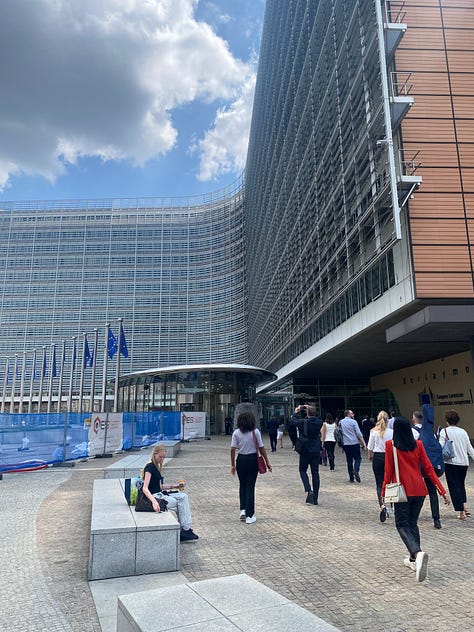It’s been a strange week to tour around the Brussels bubble and visit NATO headquarters. As interesting as our meetings were, they seemed oddly disconnected from current events, given that what appears to be a full-scale war is breaking out across the Middle East. I was at the European Commission on the day the European High Representative for Foreign Affairs and Security Policy gave a brief press conference about the latest events between Israel and Iran. But the main takeaway I got was that it’s not entirely clear what Europe can do. So far, EU officials have continued to call for everyone to return to the negotiating table.
Meanwhile, events on the ground and in Washington seemed chaotic. Initially, it was unclear how involved the U.S. was or would be. Trump went from claiming there was no U.S. involvement in Israel’s decision to bomb Iran to suddenly suggesting the U.S. might have air superiority over the country.
Israel reportedly shared intelligence with the United States that suggested Iran may have been developing a nuclear explosive triggering system. But the U.S. intelligence community and other independent experts say there’s no evidence that Iran was close to having nuclear weapons. Even if developing them were their goal (they might have been experimenting with capabilities without the intention of actually producing a weapon), experts say it would have taken many months to build a weapon that could be mounted on a warhead and delivered overseas.
The timing of Israel’s strikes seemed designed to derail the Trump administration’s efforts to reach a nuclear agreement with Iran, rather than being tied to any imminent threat. Senator Chris Murphy, a Democrat on the Senate Foreign Relations Committee, said he was briefed last week on the intelligence and “Iran posed no imminent threat of attack to the United States.”
“Iran was not close to building a deliverable nuclear weapon,” Murphy said. “The negotiations Israel scuttled with their strikes held the potential for success.”
Now the United States has entered the war, dropping bombs on three nuclear sites in Iran. Israeli Prime Minister Benjamin Netanyahu, meanwhile, seems to be gunning for regime change, and it’s unclear whether there’s any plan for what would come next.
Hundreds of people are estimated to have died in Iran over the last week already, and at least several dozen have been killed in Israel. Thousands are reportedly evacuating Tehran.



For the entire month of June, I am offering a significantly discounted rate for anyone who wants to become a paid subscriber of Lazo Letters: $25.50 per year, or just over $2 per month.
Lazo Magazine also has a Buy Me A Coffee Page, which allows you to make easy, one-off payments to support us with caffeine. ☕
What I’m writing:
• I wrote about Donald Trump’s big budget request, which comes as Washington pushes NATO allies to spend more on defense ahead of a crucial summit. U.S. lawmakers argue that Trump’s policies are harming military readiness and making it more difficult for the United States to meet its military spending goals. This story is now unlocked and available to read.
My weekly news blurbs:
What I’m reading:
• David Patrikarakos reports for the Dispatch about how Ukrainians are continuing to party under constant bombardment. 🫶
• The Trump administration recently ended the working group it set up to formulate strategies for pressuring Russia into accelerating peace talks with Ukraine, Reuters reports.
• North Korea will send two military brigades of 5,000 people to help with the “restoration” of Russia’s war-torn Kursk region, the BBC reports.
• Trump’s envoy to Ukraine, Keith Kellogg, traveled to Minsk to meet with Belarusian dictator Alexander Lukashenko, becoming the first high-level American official to meet with the leader since he stole the 2020 election in Belarus, Reuters reports.
• Belarusian opposition figure Siarhei Tsikhanouski was released along with 13 other political prisoners following talks between Belarusian President Alexander Lukashenko and Keith Kellogg, who is President Trump's envoy for Ukraine. Sky News has the story.
• Serbia’s Russia-friendly leader, Aleksandar Vučić, made a surprise visit to Ukraine for a summit on strengthening European support for Kyiv’s fight against Russian aggression, the Associated Press reports.
• Air Mail has a piece on why Jared Kushner is pursuing a multi-billion-dollar development deal on an uninhabited—and uninhabitable—former Cold War base in Albania.
• Donald Trump and British Prime Minister Kier Starmer said they had finalized their trade agreement to reduce U.S. tariffs on British cars, steel, aluminum, and aerospace equipment, the New York Times reports.
• The European Union and Australia announced they agreed to begin negotiations on a “Security and Defense Partnership.”
• Israeli Prime Minister Benjamin Netanyahu said that regime change in Iran could be a result of Israel's military attacks on the country and that Israel will do “whatever is necessary” to remove the “existential threat” posed by Tehran, Reuters reports.
• Iran’s Supreme Leader, Ayatollah Ali Khamenei, has picked replacements in case military commanders die in Israeli strikes. He has also named possible replacements for himself, according to The New York Times.
• The Israeli military said it has killed Iran’s most senior military commander, Maj. Gen. Ali Shadmani, in an overnight strike, days after killing his predecessor, the Times of Israel reports.
• Ali Shamkani, a top aide to Iran’s Supreme Leader who was declared dead by Israel last week, has proclaimed himself alive and “in stable condition,” Andalou Agency reports.
• A spokesperson for Israel’s military claimed Israel has “full aerial operational control” over western Iran and the capital city of Tehran and that Israel has destroyed one-third of Iran’s surface-to-surface missile launchers. The Wall Street Journal has the story.
• Israel widened its military campaign against Iran by targeting Iran’s gas and petrochemical refineries, the New York Times reports.
• U.S. forces pulled out of two further bases in northeastern Syria, expediting a troop drawdown that the commander of U.S.-backed Syrian Kurdish forces said was allowing a resurgence of the self-styled Islamic State group. Reuters has the story.
• A former senior Syrian security official and member of former President Bashar al-Assad’s inner circle, Bassam al-Hassan, told the FBI that Assad in 2013 ordered the killing of Austin Tice, a freelance journalist who was kidnapped in Syria. The Washington Post has the story.
• India’s Prime Minister Narendra Modi told Donald Trump that the India-Pakistan ceasefire was achieved through direct bilateral talks between the two militaries and not U.S. mediation, Reuters reports.
• Thailand’s Prime Minister Paetongtarn Shinawatra is facing growing pressure to resign, after appearing to criticize the military in a leaked phone call she had with Cambodia’s former leader over a border dispute, CNN reports.
• The Democratic Republic of Congo and Rwanda will sign a peace agreement in Washington on June 27, in a significant step that aims to end fighting in the eastern Congo, the Associated Press reports.
• Rwanda arrested prominent opposition leader Victoire Ingabire on charges of inciting the public and creating a criminal organization, Reuters reports.
You can write to me for any reason: c.maza@protonmail.com






